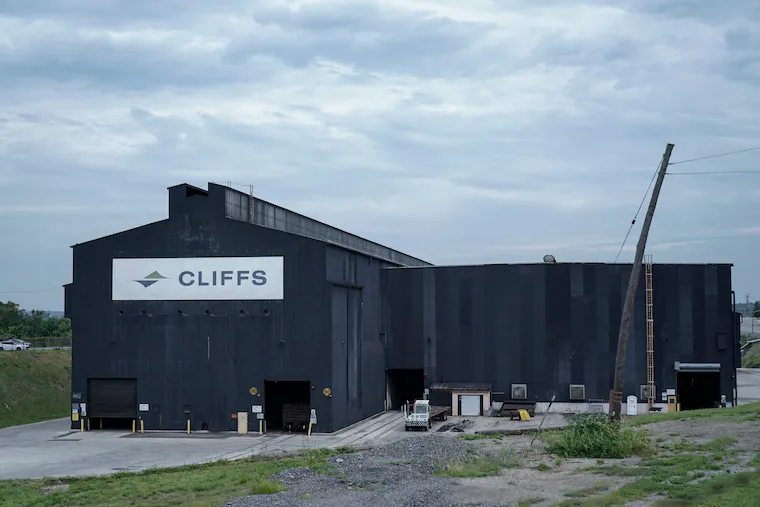
A prominent developer’s plan to build an AI data center less than a mile from downtown Conshohocken hit a roadblock this week when a Plymouth Township board voted against the project given resident backlash.
But the process is far from over: Another board in Plymouth Township, where the center would be located, is set to consider the proposal later this month.
Brian O’Neill, a Main Line developer who has invested heavily in Conshohocken, wants to turn the Cleveland-Cliffs steel mill into a 2 million-square-foot data center that would span 10 existing buildings. The longtime plant at 900 Conshohocken Rd. closed this summer, laying off more than 100 workers.
O’Neill said he could not disclose the tenant who would operate the proposed center, which would sit on 66 acres along the Schuylkill River in Montgomery County.
At a Plymouth Township planning board meeting on Wednesday, O’Neill called his proposal a “sensitive, historic renovation” that would put the area on the cutting-edge of an in-demand industry and attract more businesses to the region.
Data centers house the machines that power ChatGPT queries and other increasingly sophisticated — and power-hungry — artificial-intelligence tools. They are rapidly being built across the county as AI companies try to meet surging demand.
In July, the Trump administration issued an “AI Action Plan” to streamline data-center construction, which included rolling back some environmental regulations. Gov. Josh Shapiro has said he wants Pennsylvania to be a leader in AI computing and this summer lauded forthcoming Amazon data centers, including one to be built on a former steel mill in Falls Township, Bucks County.
» READ MORE: Dave McCormick, Donald Trump announce billions in AI and energy investments in Pa. at innovation summit: ‘The nation’s future depends on us’
O’Neill said the Conshohocken Road center would provide its own energy generation via natural gas; be built by 12,000 union workers; and lead to $21 million a year in tax revenue (a figure one board member disputed). The facility should be permitted in the “heavy industrial” zone, he said, because it is similar to a warehouse or laboratory, which are permitted uses under township code.
O’Neill declined to comment for this article, citing confidentiality agreements.
“Industry hasn’t come and gone. It’s simply changed,” he said at Wednesday’s meeting. “What I’m proposing is to put 21st-century industry into an industrial building.”
Some of the property’s neighbors, however, weren’t sold on the idea.
Why Conshohocken-area residents oppose the data center
At the meeting, more than a dozen residents spoke in opposition to the plan, citing concerns about environmental, light, and noise pollution; electricity prices; safety, and the risk of an “AI bubble.”
Referencing the meeting’s purpose — which was to determine whether to recommend a special zoning exception for the data center — the first public commenter, Patti Smith, said the proposal would seem to fall under a prohibited use, according to her reading of the code.
“We’re not convinced that this would be in our welfare,” said Smith, who lives next to the plant in the township’s Connaughtown neighborhood.
Smith’s roommate, Genevieve Boland, cited the pressure that existing data centers have put on the electric grid, driving up prices. Philadelphia-area customers are already on the same PJM grid as Virginia’s “Data Center Alley,” the world’s largest concentration of data centers.
Near “significant data center activity,” electricity now costs up to 267% more per month than it did five years ago, according to a Bloomberg analysis published Monday.
“If you’re wondering why your electricity prices are already so high, you can thank data centers,” Boland said, echoing an argument made in several recent news reports.
» READ MORE: Their electric bills hit record highs this summer, from the Main Line to the Jersey Shore
Paul Tornetta, who owns the neighboring Proving Grounds sports complex and Tee’s Golf Center, said he’s concerned the center could include several “smokestacks,” citing the turbines in O’Neill’s proposal, which may blow toward downtown Conshohocken.
“I like data centers,” Tornetta said, “just not here.”
Resident Amber Boyd-Finch said her family was sold on moving to Connaughtown in part because it was down the street from a playground. She can’t picture her children playing there in the shadow of a data center.
“You want to put that right next to their playground?” she said.
In response to resident concerns, O’Neill said emissions would be regulated by state and federal agencies, and the center’s outdoor lighting would amount to “less than a single soccer field.” He reiterated that this project would be an asset to the area, which has struggled with office vacancies since the pandemic.
“I love Conshohocken,” O’Neill said, “and I’ve invested more there than … anybody else.”
The Plymouth Township planning board voted 4-0 against recommending O’Neill’s project for an exception by the zoning hearing board, which is set to consider his application at its Oct. 20 meeting.
The zoning board is not required to follow that board’s recommendation, said township zoning officer Joel Rowe.
If the zoning board approves the application, the developers then must go through a land development application process, he said, and obtain building permits.
Within 30 days of a zoning board decision, anyone can file an appeal with the Montgomery County Court of Common Pleas.
A quick organizing effort in Connaughtown
Wednesday’s neighborhood opposition was organized by Smith and Boland, lifelong friends and Connaughtown roommates. They said they see their plight as “a small-town issue that is happening across thousands of small towns” — and that is requiring residents to act fast.
The pair learned of the proposal Sunday in an article on local news site More Than The Curve. Boland, who works in corporate sustainability, and Smith, a law student who recently left a federal government job, said they were immediately concerned.
“We’re not anti-AI,” Boland said. “We’re anti-deep-pocketed people coming into town, whatever their motives are, to put more money in their pocket and really take advantage of people.”
By midnight, they said they had posted in several local Facebook groups. By 9 a.m. Monday, Boland had delivered more than 100 fliers to neighbors and spent time with several older residents who had questions about data centers.
They said the issue brought people together in a matter of days.
O’Neill “was trying to tell us what our town needs, disregarding the vision that the residents were bringing up,” Smith said. “The community itself showed that we have data scientists. We have engineers. We have these people in our community. They showed up and they directly refuted what this developer is trying to sell us.”
The 29-year-old Lansdale natives are renters in Connaughtown. They don’t know where they’ll be living in the future. But they said their next steps are irrelevant; they see one potential data center as having repercussions up and down the Schuylkill River, across the region, and across the country.
Despite the meeting’s outcome, the pair said they know their “David and Goliath fight” is just beginning.
“If we lose it here,” Smith said, “there is no redo.”



